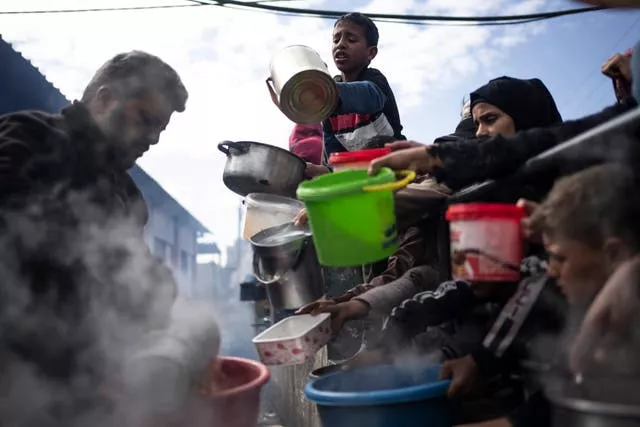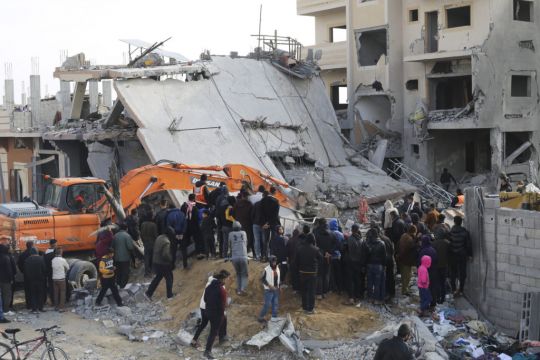Talks on a potential ceasefire deal in Gaza “have not been progressing as expected” in the past few days, after good progress in recent weeks, key mediator Qatar said on Saturday, as Israel’s prime minister accused the Hamas militant group of not changing its “delusional” demands.
Speaking during the Munich Security Conference, Qatar’s prime minister, Sheikh Mohammed bin Abdurrahman Al Thani, said there were difficulties in the “humanitarian part” of the negotiations.
Israeli Prime Minister Benjamin Netanyahu, who is under pressure to bring home remaining hostages taken in the October 7 Hamas attack, said he sent a delegation to ceasefire talks in Cairo earlier in the week at the request of US President Joe Biden, but does not see the point in sending them again.
Hamas wants a permanent ceasefire in Gaza and the release of Palestinians held by Israel.

Mr Netanyahu also rejected international concern about a planned Israeli ground offensive in Rafah, a city on southern Gaza’s border with Egypt.
He said “total victory” against Hamas requires the offensive, once people living there evacuate to safe areas. Where they will go in largely devastated Gaza is not clear.
New airstrikes in central Gaza on Saturday killed more than 40 people, including children, and wounded at least 50, according to Associated Press journalists and hospital officials. Israel’s military said it carried out strikes there against Hamas.
Five people were killed in an Israeli airstrike that targeted a house outside Khan Younis in the south, according to health officials, and another five people, including three children, were killed in an airstrike on a building north of Rafah.
Dr. Marwan al-Hams, director of Abu Yousef al-Najjar Hospital, said other bodies were being pulled from the rubble.
Israel’s air and ground offensive was triggered by the October 7 attack that killed some 1,200 people in Israel and took 250 others hostage.

The Gaza Health Ministry on Saturday raised the overall death toll in Gaza to 28,858, saying the bodies of 83 people killed in Israeli bombardments were taken to hospitals in the past 24 hours.
The count does not differentiate between combatants and civilians, but the ministry says two-thirds of those killed are women and children.
The war also has caused widespread destruction, displaced some 80% of Gaza’s population and sparked a humanitarian crisis in the Hamas-run enclave.
More than half of Gaza’s 2.3 million people are packed into Rafah, which Israel portrays as the last significant stronghold of Hamas fighters.
Mr Biden has urged Israel not to carry out an operation there without a “credible” plan to protect civilians and to instead focus on a ceasefire. Egypt has said an operation could threaten diplomatic relations.
Israel has said it has no plans to force Palestinians into Egypt. New satellite photos, however, indicate that Egypt is preparing for that scenario.
אנחנו בדרך לניצחון.
הלוחמים דורשים זאת, הפצועים דורשים זאת, משפחות שכולות דורשות זאת, ורוב עצום בעם דורש זאת.
כדי להשיג את הניצחון אנחנו צריכים דבר אחד - אחדות.
לא אחדות לרגע, אלא אחדות אמיתית. pic.twitter.com/4bcynoUXa4— Benjamin Netanyahu - בנימין נתניהו (@netanyahu) February 17, 2024
The images show Egypt building a wall and levelling land near its border with Gaza.
Egyptian foreign minister Sameh Shoukry, who also spoke at the Munich Security Conference, said “it is not our intention to provide any safe areas or facilities, but we will provide the support to the innocent civilians, if that was to take place”.
President Abdel Fattah el-Sisi said during a call with France’s leader that Egypt categorically rejected “the displacement of Palestinians to Egypt in any way, shape or form”, according to Mr el-Sisi’s office.
Two senior Egyptian officials said Egypt is building additional defensive lines in an existing buffer zone that extends three miles from the border.
The buffer zone, built as part of Egypt’s battle against an insurgency by the so-called Islamic State group, was meant to prevent weapons smuggling to and from Gaza.







